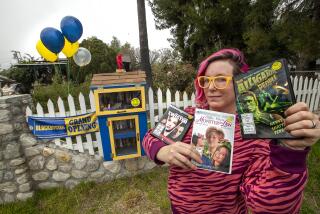Video Library Unworried by Pack of Rivals
- Share via
The convenience store across the street from Video Library’s Morena Boulevard outlet shows how fragmented the home video rental market has grown. Driven by a trend that has swept through the convenience store industry, the Circle K now offers low-cost movie rentals along with milk, bread, beer and other staples.
During a visit to the Circle K store last Wednesday, Video Library Chairman Barry Rosenblatt acknowledged that the convenience store’s rental fees--99 cents on weekdays and $1.99 on weekends--are attractive.
But Rosenblatt, who calculated that a third of Circle K’s more than 100 titles already had been checked out, argued that selection, not price, is the key to growth in the fiercely competitive business.
Rosenblatt was unconcerned that on the same afternoon, thousands of titles, including dozens of copies of the most popular tapes, were sitting idle on Video Library’s shelves.
“Who rents movies on Wednesday afternoon?” asked Rosenblatt, who founded Video Library in 1979 and guided it though a successful 1985 initial public offering that generated $3.6 million.
For Video Library, the real business occurs on weekends, and by early evening last Friday, the store’s four computerized cash registers were humming as customers snapped up copies of “Top Gun,” “Aliens,” “Stand by Me” and other hot titles.
Customers “know they’ll stand a good chance of getting (the title) they want at Video Library,” said Rosenblatt, who added that although Circle K generally has one copy of each of the most popular movies, Video Library buys dozens for each store.
Video Library, which offers hundreds of different titles--and stocks as many as 70 copies of the hottest films at each store--last year rented 4.5 million videos and boosted its store count to 32 in San Diego County, up from 23 at the end of the previous year.
The number of video rental outlets in the nation rose to 30,000 in 1986 from 7,000 in 1983, according to the Fairfield Group, a Connecticut-based video market consulting firm. Fairfield predicts that the nation’s videocassette consumers eventually will support about 44,000 rental outlets.
Rosenblatt, who founded the San Diego-based company in 1979 and took it public in 1985, anticipates that Video Library will open as many as 12 additional stores during 1987. He predicts that rentals will soar to more than 6 million, and that the chain will grow to as many as 65 stores by the end of 1989.
Rosenblatt also believes that Video Library eventually could expand outside San Diego County by acquiring a small out-of-county chain. Video Library won’t move into Orange and Los Angeles counties, however, because large record and video store chains there are resorting to fierce price discounts to build market shares, Rosenblatt said.
Those large chains and the convenience stores that charge less than $2 in rental fees “can’t be covering their costs,” said Rosenblatt, who expects Video Library to remain profitable while it expands.
The firm used $1.5 million from its $3.6 million public offering to open stores during 1985 and 1986, but Rosenblatt said Video Library has enough cash to fund future expansion without another public offering.
However, one industry analyst predicted that Video Library would have to return to the market to finance further expansion beyond San Diego County.
Partly because of the elimination of federal investment tax credits, Video Library’s profitability slipped during the fourth quarter ended Dec. 31, with the company reporting a $59,299 net loss compared to an $88,843 net profit during the same period in 1985. Fourth-quarter revenue increased from $2.1 million to $3.5 million.
For the year, Video Library reported an $816,395 net profit and an increase in revenue from $7.4 million to $12.1 million. It reported a $44,541 net loss for 1985.
To “minimize” the loss of tax credits, Video Library accelerated sales of used movies, generating a $239,797 book loss on the sale of used movies during the fourth quarter. The company also trimmed the amortization period on its purchased videocassettes to three years from five years, generating a $265,203 charge to income during the second, third and fourth quarters.
More to Read
Inside the business of entertainment
The Wide Shot brings you news, analysis and insights on everything from streaming wars to production — and what it all means for the future.
You may occasionally receive promotional content from the Los Angeles Times.










